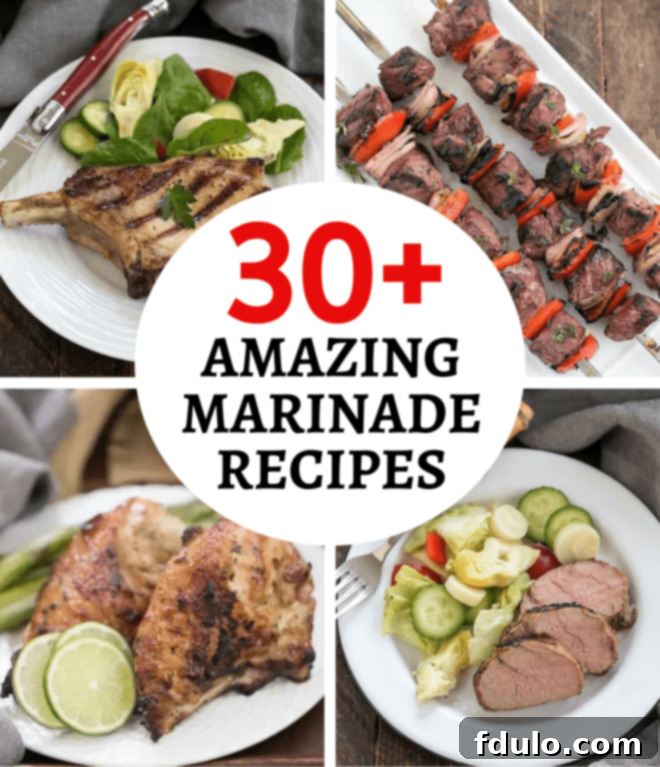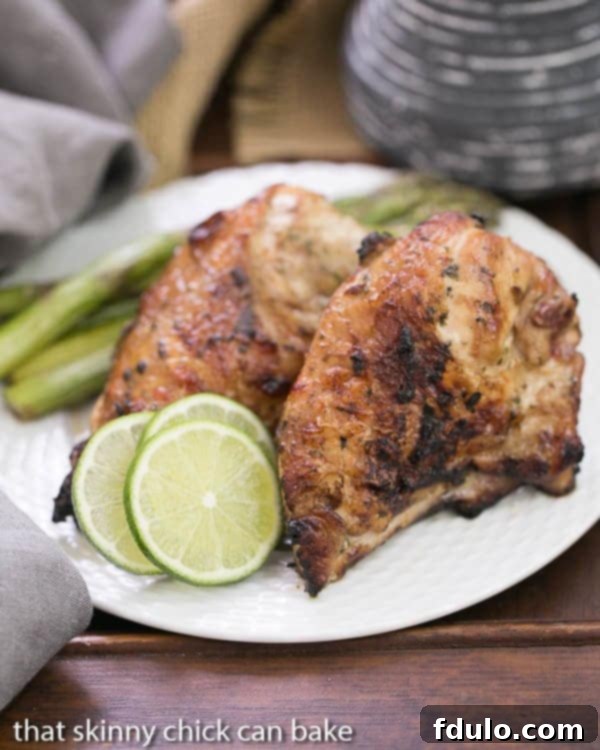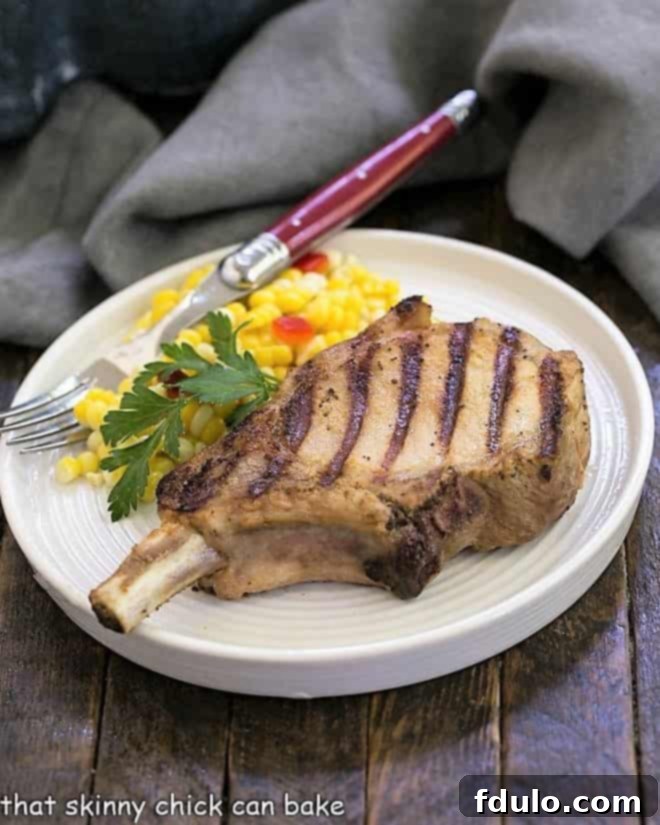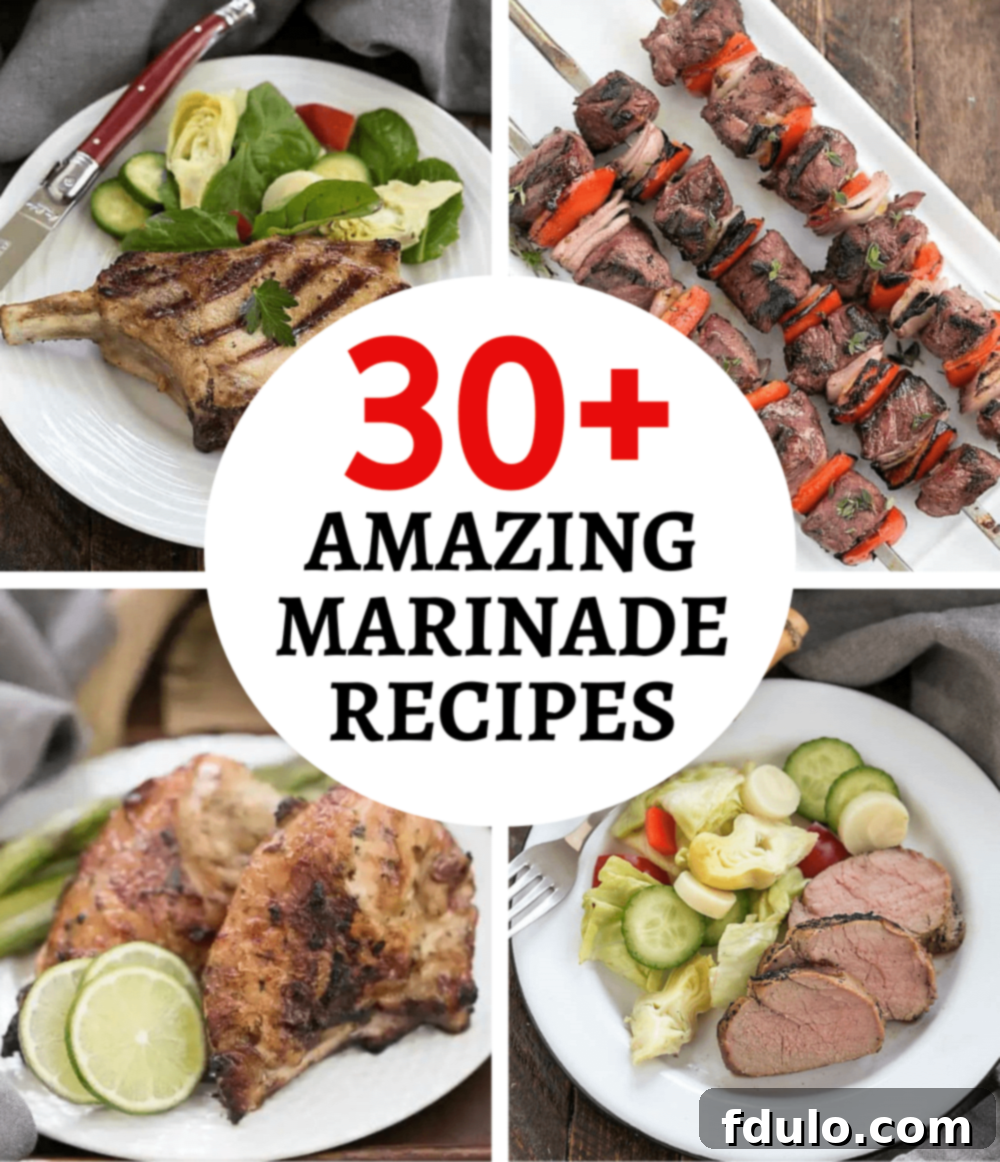Master the Grill: The Ultimate Guide to Irresistible Marinade Recipes
Transform your grilling experience from ordinary to extraordinary with the magic of marinades! These simple yet powerful concoctions are your secret weapon for infusing deep, tantalizing flavors and ensuring every bite of your grilled masterpiece is incredibly moist and tender. Forget dry, bland meat; with the right marinade, you can unlock a world of culinary delight that perfectly complements the smoky char from your charcoal or gas grill.
Whether you’re a seasoned grill master or just starting your journey, marinades offer an effortless way to elevate any dish. From robust beef cuts and succulent chicken breasts to delicate seafood and vibrant vegetables, there’s a perfect marinade for every ingredient. In this comprehensive guide, we’ll dive into the science behind great marinades, share expert tips for flawless results, and provide a treasure trove of the best marinade recipes to inspire your next BBQ adventure.

Why Marinades Are Your Grilling Secret Weapon
Marinades do far more than just add flavor; they play a crucial role in enhancing the texture and overall quality of your grilled food. They are an essential step for anyone aiming for truly exceptional results off the grill.
Flavor That Goes Deep
Unlike surface seasonings, marinades penetrate the outer layers of meat, fish, or vegetables, infusing flavor deep into the cellular structure. This means every bite is bursting with taste, not just the initial surface layer. Imagine biting into a chicken breast where the zesty lemon, aromatic herbs, and savory garlic have permeated throughout, creating a consistent and delightful flavor profile. This deep infusion ensures a richer, more satisfying eating experience that simple rubs cannot achieve alone.
Unmatched Tenderness and Moisture
One of the most significant benefits of marinating is its ability to tenderize tough cuts of meat and lock in moisture. The acidic components in marinades—such as citrus juices, vinegars, or dairy products—work to break down the proteins on the surface of the meat. This process relaxes the muscle fibers, resulting in a noticeably more tender texture. Simultaneously, the oil in the marinade creates a barrier that helps prevent moisture loss during the high heat of grilling, ensuring your food remains juicy and succulent. This dual action is particularly beneficial for leaner cuts that tend to dry out quickly on the grill.
Simplicity and Customization
Marinades are incredibly simple to prepare, often requiring just a few pantry staples. Most recipes call for a combination of an acid, an oil, and various flavorings like herbs, spices, and aromatics. The beauty lies in their versatility; with endless variations, you can easily customize them to suit your taste, the type of protein you’re grilling, or a specific cuisine you’re aiming for. Want an Asian-inspired dish? Reach for soy sauce, ginger, and garlic. Craving Mediterranean? Olive oil, lemon, oregano, and rosemary are your friends. The possibilities are truly limitless, making marinades an accessible tool for home cooks to experiment and personalize their meals.
Essential Marinade Science & Expert Tips
Understanding the fundamental principles behind effective marinating will empower you to create perfect results every time. Here are some expert tips to ensure your marinades work their magic to the fullest:
The Power of Acid: Tenderizing Agents
Acid is a cornerstone of any good marinade, primarily for its tenderizing properties. It begins to break down the tough connective tissues in meat, making it softer and more palatable. Common acidic ingredients include:
- Citrus Juices: Lemon, lime, orange, and grapefruit juices not only tenderize but also impart a bright, fresh flavor. They are fantastic for chicken, fish, and lighter meats.
- Vinegars: Balsamic, red wine, apple cider, and white vinegars offer a range of tangy notes and are excellent for beef and pork.
- Dairy Products: Yogurt and buttermilk contain lactic acid, which tenderizes gently and adds a creamy richness, particularly good for chicken.
- Wine: Red or white wine can add depth of flavor and acidity, often used in more sophisticated marinades for beef or lamb.
PRO-Tip: Balance is key. Too much acid or marinating for too long can “cook” the meat (like ceviche) or make it mushy. Aim for approximately 1/4 to 1/3 of your marinade volume to be acidic ingredients.
The Role of Oil: Flavor Carriers and Moisture Locks
Oil serves multiple crucial functions in a marinade. It helps to dissolve and carry fat-soluble flavors from herbs and spices, distributing them throughout the food. It also acts as a protective layer, helping to seal in moisture during cooking and preventing the food from sticking to the grill grates. Good choices include:
- Olive Oil: A versatile option, especially extra virgin olive oil for its fruity notes, suitable for almost all marinades. Its monoglycerides and diglycerides may also aid in penetration.
- Vegetable Oils: Canola, sunflower, or grapeseed oils are neutral in flavor and have high smoke points, making them excellent choices for grilling.
- Sesame Oil: Ideal for Asian-inspired marinades, providing a distinct nutty aroma.
Flavor Builders: Herbs, Spices, and Aromatics
This is where you can truly get creative! Herbs, spices, and aromatics are responsible for the distinctive character of your marinade. Think fresh garlic, ginger, rosemary, thyme, oregano, chili flakes, paprika, cumin, and soy sauce. These ingredients infuse their essences into the food, creating a complex and inviting aroma and taste.
Precision in Marinating: Quantity and Duration
Quantity: A good rule of thumb is to use approximately 1/2 cup of marinade for each pound of meat. This ensures adequate coverage without excess waste.
Duration: Marinating time is critical and varies significantly depending on the type of food and the strength of the acid. Delicate proteins like fish and shrimp require very short marinating times (15-30 minutes), while tougher cuts of beef or lamb can handle longer periods (up to 24 hours). Over-marinating, especially with strong acids, can lead to a “mushy” or mealy texture as the proteins break down too much. Always refer to specific guidelines for each type of food.
The Right Tools: Non-Reactive Containers and Safe Practices
Always use a non-reactive container for marinating. Materials like Pyrex casserole dishes, ceramic bowls, glass containers, or high-quality freezer-safe plastic bags (like Ziploc bags) are ideal. Avoid using metal or aluminum foil, as the acid in the marinade can react with these materials, potentially imparting an unpleasant metallic taste or even leeching harmful compounds into your food. Remember to turn the meat at least once (or flip the bag) to ensure even exposure to the marinade.
Food Safety: Always marinate food in the refrigerator. Never marinate at room temperature, as this can encourage bacterial growth. Furthermore, never reuse marinade that has been in contact with raw meat, as it will contain raw meat juices and potential bacteria. If you wish to use some of the marinade as a basting sauce, separate a portion before adding it to the raw meat.
Salt Smartly: While salt is a crucial flavor enhancer, be mindful not to oversalt your marinade. Excessive salt can draw moisture out of the meat through osmosis, making it dry rather than juicy.

Dive into Our Best Grilling Marinade Recipes
Now that you understand the art and science of marinating, it’s time to put that knowledge into practice! Below, you’ll find a curated selection of our favorite marinade recipes, categorized by protein, to help you create unforgettable meals on the grill.
Beef Marinades: Achieving Steakhouse Quality at Home
Beef, with its rich flavor and robust texture, greatly benefits from marinating, which can tenderize tougher cuts and infuse them with incredible taste. Cuts like flank steak, skirt steak, sirloin, and even chuck benefit immensely. Marinate beef for a minimum of 3 hours and up to 24 hours for optimal results. When grilling, aim for an internal temperature of 125°F for rare, 130-135°F for medium-rare (highly recommended for most steaks), 135-140°F for medium, 140-150°F for medium-well, and 155°F for well done (though often not recommended for steak connoisseurs as it can dry out). For ground beef, always cook to a safe internal temperature of 160°F to mitigate the risk of e-coli.
- Soy, Orange Juice, and Red Wine Marinade – A delightful balance of savory, sweet, and tangy.
- Easy Grilled Flank Steak – Simple yet incredibly flavorful, perfect for a quick weeknight meal.
- Beef Teriyaki Kabobs – Sweet and savory Japanese-inspired skewers.
- Korean Grilled Flank Steak – Bold, garlicky, and slightly spicy flavors.
- Grilled Korean Beef Steaks – Another fantastic option for Korean BBQ lovers.
- Flank Steak Fajitas – Zesty and smoky, ideal for Tex-Mex night.
- Grilled Beef Shish Kebobs – Classic Mediterranean-inspired skewers.
- Best Steak Marinade from Healthy Delicious – A go-to for many steak enthusiasts.
- 5 Easy Steak Marinades from Gimme Some Oven – A collection of quick and versatile options.
- Plus, explore creative serving ideas with this post on How to Make the Ultimate Steak Charcuterie Board from Our Tiny Nest.

Chicken Marinades: Juicy, Flavorful Poultry Every Time
Chicken is a blank canvas for flavors, and marinades are perfect for preventing it from drying out on the grill while infusing it with exciting tastes. Chicken breasts, thighs, wings, and whole chickens all benefit from a good soak. Marinate chicken for 3 to 12 hours, being careful not to over-marinate, especially with highly acidic mixtures. Cook chicken breasts to an internal temperature of 165°F, thighs to 165-175°F for optimal tenderness and flavor, and chicken burgers to 170°F. Remember that ground chicken, like ground beef, requires a higher cooking temperature due to the potential spread of bacteria like salmonella during the grinding process.
- Thai Chicken – Marinated in coconut milk and exotic spices for an authentic taste.
- Honey Glazed Chicken Kebobs – Sweet and sticky perfection on a stick.
- Feta Chicken Kabobs – A Mediterranean delight with tangy feta and fresh herbs.
- Mustard Garlic Lime Marinated Chicken – A bright and zesty marinade with a hint of pungent mustard.
- Lemon Herb Grilled Chicken Marinade from Tidy Mom – Classic, aromatic, and always a crowd-pleaser.
- Mexican Chicken Marinade from Little Sunny Kitchen – Packed with vibrant spices for a fiesta of flavors.
- Best Chicken Marinade from Mom on Timeout – A highly-rated, versatile marinade recipe.

Pork Marinades: Enhancing Sweet and Savory Cuts
Pork, especially leaner cuts like tenderloin and chops, greatly benefits from marinades to keep it moist and infuse it with flavor. Marinades can transform pork into succulent, flavorful dishes. Marinate pork for 3 to 12 hours. Cook pork to an internal temperature of 145°F for medium-rare, 150°F for medium, and 160°F for both well-done pork and pork burgers. A slight pink hue at 145°F is perfectly safe and indicates a juicy, tender result.
- The Best Pork Marinade – A robust and versatile option for various pork cuts.
- Easy Pork Tenderloin Marinade – Quick to prepare, delivers big on flavor.
- Whiskey Marinated Pork Tenderloin – Adds a sophisticated, smoky depth.
- Maple Grilled Pork Tenderloin – Sweet and savory, perfect for a subtle glaze.
- Grilled Pork Chop Marinade – A tangy and sweet combination for juicy chops.
- Easy Pork Chop Marinade from Easy Budget Recipes – A simple, flavorful solution for pork chops.
- Easy Pork Tenderloin Marinade from Spend with Pennies – Another excellent choice for tenderloin.

Lamb, Seafood, and Vegetable Marinades: Expanding Your Grilling Horizon
Don’t limit marinades to just beef, chicken, or pork! Lamb, seafood, and even vegetables can be magnificently enhanced with the right marinade, bringing out unique flavors and textures.
Lamb: Marinating times and doneness temperatures for lamb are similar to beef. Lamb has a distinctive flavor profile that pairs wonderfully with robust herbs like rosemary, mint, and garlic. Marinate lamb for 3-24 hours.
Seafood and Shellfish: Due to their delicate nature, fish and shellfish require significantly shorter marinating times. Shellfish like shrimp and scallops should be marinated for a mere 15-30 minutes, while fish fillets like salmon or cod can soak for 15-30 minutes. Any longer, and the acid can “cook” the delicate proteins, resulting in a rubbery or mushy texture.
Vegetables: Marinades can turn simple grilled vegetables into flavorful side dishes or even main courses. Bell peppers, zucchini, eggplant, mushrooms, and onions absorb flavors beautifully. Marinate vegetables for up to 30 minutes, as their porous structure allows for quick flavor absorption.
- Grilled Lamb Chops – Aromatic and savory with classic Mediterranean flavors.
- Greek Lamb Kabobs – Infused with oregano, garlic, and lemon for an authentic taste.
- Cedar Plank Salmon – Adds a unique smoky aroma and flavor to tender salmon.
- Easy Glazed Salmon – Simple yet elegant, with a delicious sweet and savory glaze.
- Grilled Shrimp Scampi – Garlicky and buttery, perfect for a quick, flavorful bite.
- Prosciutto Wrapped Shrimp – A delightful combination of savory and slightly salty.
- Grilled Margarita Shrimp – Zesty and fun, reminiscent of your favorite cocktail.
- Rosemary Prosciutto Shrimp – An aromatic and flavorful pairing.
- Marinated Vegetable Salad (not grilled) – A versatile marinade for fresh veggies.
- Easy Baked Shrimp from Living Locurto – A simple marinade for an alternative cooking method.
- Marinated Grilled Squash from More than Meat and Potatoes – Elevates a humble vegetable to new heights.
- Grilled Vegetables from What a Girl Eats – A general guide for delicious grilled veggies.
Frequently Asked Questions About Marinades
Here are answers to some common questions about marinades, designed to help you become a more confident and successful griller.
What Are the Three Main Components of a Marinade?
The primary components of a marinade are typically an acid, an oil, and various flavorings. The acid, which can be citrus juice, vinegar, yogurt, buttermilk, or even wine, helps tenderize the food. The oil acts as a carrier for fat-soluble flavors and helps retain moisture. Flavorings, such as herbs, spices, garlic, ginger, soy sauce, and sweeteners, are added to impart distinct tastes and aromas to your food.
How Do You Make a Marinade?
Making a marinade is incredibly straightforward. The simplest method is to whisk all the ingredients together in a bowl until well combined. For an even smoother and potentially thicker marinade, you can use a blender. If using a blender, slowly drizzling in the oil while the other ingredients are mixing can help to emulsify the marinade, much like making mayonnaise. An emulsified marinade will have a thicker consistency, allowing it to cling better to the surface of the meat and impart more flavor.
Should You Marinate in the Refrigerator?
Absolutely, yes! For food safety reasons, it is crucial to always marinate in the refrigerator. Marinating at room temperature creates an ideal environment for harmful bacteria to multiply rapidly, significantly increasing the risk of food poisoning. Additionally, never reuse marinade that has been in contact with raw meat, poultry, or seafood. Raw meat juices can contain bacteria that would then be transferred to cooked food if the marinade is reused without being brought to a rolling boil for several minutes.
What’s the Best Oil to Use in a Marinade?
While various oils can work well, olive oil is a popular choice for its flavor and potential to aid in flavor penetration. However, neutral-flavored vegetable oils like canola oil, sunflower oil, or grapeseed oil are also excellent options, especially if you prefer the marinade’s other flavors to stand out. These oils also tend to have higher smoke points, which is beneficial for grilling. The key is to choose an oil that complements the overall flavor profile of your marinade.
How Long Should You Marinate?
The ideal marinating time largely depends on the type and thickness of the food you’re preparing. More delicate proteins, such as fish and shellfish, require much less time, typically 15 to 30 minutes, due to their tender structure and the rapid action of acids. Tougher cuts of beef or lamb can handle longer marinating periods, ranging from 3 to 24 hours, allowing the acids and enzymes more time to tenderize and infuse flavor. Over-marinating, particularly with strong acidic ingredients, can break down the proteins too much, resulting in a mushy or undesirable texture. Always refer to the specific marinating times recommended for each category of food to achieve the best results.
Helpful Tools for Marinating and Grilling
Having the right tools can make your marinating and grilling process much smoother and more enjoyable. Here are some essential items that will elevate your outdoor cooking:
- Grilling Tongs – Essential for safely flipping and handling hot food on the grill.
- Wusthof 4-Piece BBQ Chef’s Tool Set – A premium collection of grilling tools for serious grillers.
- Metal Skewers – Perfect for creating delicious kabobs with your marinated meats and vegetables.
- Whisk – For effortlessly blending your marinade ingredients. A blender can also work wonders, especially for emulsifying the mixture.
- Non-reactive bowls – Crucial for mixing marinades, preventing unwanted reactions with acidic ingredients.
- Pyrex Dishes – Excellent non-reactive containers that are perfect for marinating.
- Freezer Quality Gallon Ziploc Bags – A convenient and effective way to marinate, allowing for easy turning and minimal cleanup.
- Instant Read Thermometer – Your best friend for ensuring meats are cooked to the perfect internal temperature for safety and ideal texture.
- Sauce Pot and Basting Brush – For applying glazes or sauces during grilling (ensure any sauce that touched raw meat is boiled first).
- Charcoal Grill Chimney Starter – Speeds up the process of getting your charcoal hot and ready for grilling.
- Original Weber Charcoal Grill – A classic and reliable choice for authentic grilled flavors.
Elevate Your Grilling Game Today!
Armed with these essential marinade recipes and expert tips, you’re ready to conquer your grill like never before. Marinades are a simple, accessible way to guarantee moist, tender, and intensely flavorful results, transforming everyday meals into memorable feasts. Don’t underestimate the power of a good marinade to infuse life into your ingredients and delight your taste buds.
So, choose your favorite recipe, gather your ingredients, and start marinating! Your grill (and your dinner guests) will thank you. Experiment with different flavor combinations, adjust spices to your liking, and enjoy the incredible journey of flavor infusion.
Stay in touch through social media @ Instagram, Facebook, and Pinterest. Don’t forget to tag me when you try one of my recipes! And if you love the results, please give it a 5-star rating in the recipe card.
